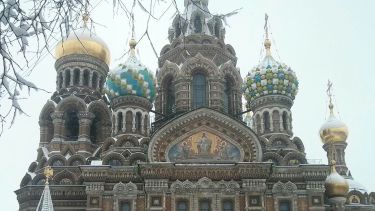Russian & Slavonic Studies - 2025 entry
Russian, spoken by more than 250 million people worldwide from the northern tundra to the Black Sea beaches, is an international language of culture and commerce.

Studying Russian is :
- The key to understanding the current conflict.
- A route into other Slavonic languages, like Czech and Ukrainian.
- A way of supporting the revival of a democratic society in Russia.
- An aid in understanding the multilingual, multicultural patchwork that is the former USSR.
Modules
The Intensive Beginners' course assumes no knowledge of the language, but with 5 hours of small-group classes per week, all taught by native speakers, you'll make rapid progress towards Common European Framework Level A2.
The Intermediate course allows you to build on GCSE Russian (or equivalent) to achieve at least Common European Framework Level B1 by the end of the year. 3 hours of small-group classes each week, all taught by native speakers, will give you a solid grounding for further study.
If you have A-level Russian (or equivalent), the Advanced course provides the ideal starting point. 3 hours of specialized native-speaker instruction per week will take you to Common European Framework Level B2.
Whichever language course you take in your first year, you'll also have a weekly 1½-hour seminar to introduce you to key aspects of Russian culture. In this way, you'll be ready for the challenges of Year 2 and beyond.
Russian Language Modules (you will take 40 credits from this group).
| Title | Credits | Core/Optional |
|---|---|---|
Russian Beginner Intensive This unit aims to consolidate a general foundation in the language and culture in order to cope with a range of predictable, everyday communicative situations encountered when interacting at a basic level, orally and in writing, with sympathetic native speakers during, for instance, a brief visit abroad. Upon successful completion of the course, students should be able to: perform at Level A1+ of the Common European Framework of Reference for Languages understand and make themselves understood orally by a sympathetic native speaker in simple, routine, predictable situations, requesting or providing factual information, and coping with unfamiliar language or unexpected responses by asking for repetition or clarification read aloud and extract key information from short, simple texts and written documents (messages, notices, instructions, brochures, etc.) talk about holidays (e.g. places they visited, food they ate) in the past and the weather write simple notes, messages and short personal letters or emails (e.g. write a postcard to a friend, fill in a simple form) demonstrate a basic insight into the most common aspects of the culture and everyday life in the target country so as to react appropriately in simple situations demonstrate a practical understanding of essential grammar terminology and a basic ability to study the language by themselves, using essential tools such as the World Wide Web or a dictionary and developing techniques for the acquisition and retention of new language demonstrate awareness in a number of transferable skills such as IT skills, presenting information, handling simple unexpected communicative situations, taking intercultural differences and language barriers into account, learning independently, etc. | 20 | Core |
Russian Advanced This unit aims to consolidate an initial preparation for a prolonged professional, academic or recreational stay in a country where the language is spoken and introduces the full range of linguistic and cultural skills required to engage in authentic and spontaneous interaction with native speakers (CEF level B2) | 20 | Core |
Russian and Czech Cultures in the Age of Empire and beyond This module gives an overview of Russian and Czech cultures with a focus on the nineteenth and twentieth centuries. It will critically examine the concepts of statehood, empire, nationalism, totalitarianism and democracy by studying the two nations' different experiences through visual sources, literature and language usage. It thus introduces students to topics dealt with in greater depth in optional modules at Levels 2 and 3, and helps them to learn how to analyse cultural artefacts and sources of different kinds. | 20 | Core |
| Languages and Cultures Essential Skills | 0 | Core |
* For language classes, you will be placed in an appropriate group for your level.
In your second year, whilst continuing to develop your spoken and listening language skills, you will also deepen your understanding of political, social, and cultural contexts. You will also have the opportunity to engage with more specialised thematic modules which explore the relationship between language, culture, and identity. Modules could include:
- Arts of Persuasion
- Why Read?
- Translation
- That is not my (Hi)story
- Language and the Self
- Languages of Gender and Sexuality
- Revolutions and Revolutionary Trends
You'll spend your third year abroad, immersed in your chosen language and culture.
Your final year on the BA Modern Languages and Cultures is about deepening the language and cultural expertise you have developed through your previous study and year abroad. You will then apply this learning to contemporary global issues and a range of career-relevant scenarios. Modules could include:
- A Languages and Cultures dissertation or translation
- Social Approaches to Multilingualism
- Tales of Cities
- Comparative Critique of Consumer Culture
- Migration and its Representations
- Global Careers in Languages
- Music and Performance
The content of our courses is reviewed annually to make sure it is up-to-date and relevant. Individual modules are occasionally updated or withdrawn. This is in response to discoveries through our world-leading research, funding changes, professional accreditation requirements, student or employer feedback, outcomes of reviews, and variations in staff or student numbers. In the event of any change we'll consult and inform students in good time and take reasonable steps to minimise disruption.
Information last updated:

International undergraduate scholarships
We are offering scholarships of £2,500 for each year (subject to a 60% average) of your undergraduate degree. The maximum value is £10,000 for four-year programmes.
